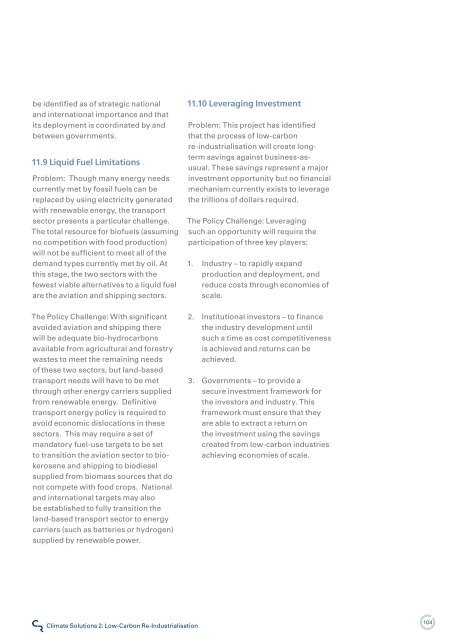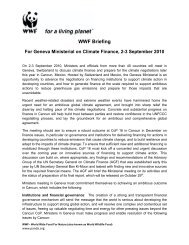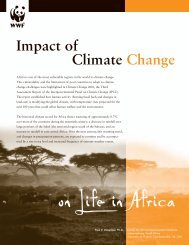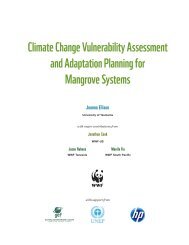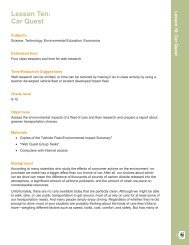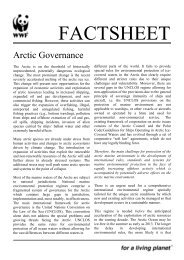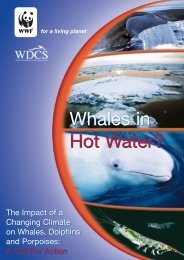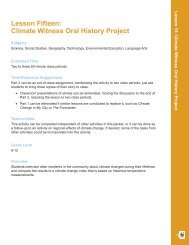Climate Solutions 2: Low-Carbon Re-Industrialisation - WWF Blogs
Climate Solutions 2: Low-Carbon Re-Industrialisation - WWF Blogs
Climate Solutions 2: Low-Carbon Re-Industrialisation - WWF Blogs
You also want an ePaper? Increase the reach of your titles
YUMPU automatically turns print PDFs into web optimized ePapers that Google loves.
e identified as of strategic national<br />
and international importance and that<br />
its deployment is coordinated by and<br />
between governments.<br />
11.9 Liquid Fuel Limitations<br />
Problem: Though many energy needs<br />
currently met by fossil fuels can be<br />
replaced by using electricity generated<br />
with renewable energy, the transport<br />
sector presents a particular challenge.<br />
The total resource for biofuels (assuming<br />
no competition with food production)<br />
will not be sufficient to meet all of the<br />
demand types currently met by oil. At<br />
this stage, the two sectors with the<br />
fewest viable alternatives to a liquid fuel<br />
are the aviation and shipping sectors.<br />
The Policy Challenge: With significant<br />
avoided aviation and shipping there<br />
will be adequate bio-hydrocarbons<br />
available from agricultural and forestry<br />
wastes to meet the remaining needs<br />
of these two sectors, but land-based<br />
transport needs will have to be met<br />
through other energy carriers supplied<br />
from renewable energy. Definitive<br />
transport energy policy is required to<br />
avoid economic dislocations in these<br />
sectors. This may require a set of<br />
mandatory fuel-use targets to be set<br />
to transition the aviation sector to biokerosene<br />
and shipping to biodiesel<br />
supplied from biomass sources that do<br />
not compete with food crops. National<br />
and international targets may also<br />
be established to fully transition the<br />
land-based transport sector to energy<br />
carriers (such as batteries or hydrogen)<br />
supplied by renewable power.<br />
11.10 Leveraging Investment<br />
Problem: This project has identified<br />
that the process of low-carbon<br />
re-industrialisation will create longterm<br />
savings against business-asusual.<br />
These savings represent a major<br />
investment opportunity but no financial<br />
mechanism currently exists to leverage<br />
the trillions of dollars required.<br />
The Policy Challenge: Leveraging<br />
such an opportunity will require the<br />
participation of three key players:<br />
1. Industry – to rapidly expand<br />
production and deployment, and<br />
reduce costs through economies of<br />
scale.<br />
2. Institutional investors – to finance<br />
the industry development until<br />
such a time as cost competitiveness<br />
is achieved and returns can be<br />
achieved.<br />
3. Governments – to provide a<br />
secure investment framework for<br />
the investors and industry. This<br />
framework must ensure that they<br />
are able to extract a return on<br />
the investment using the savings<br />
created from low-carbon industries<br />
achieving economies of scale.<br />
<strong>Climate</strong> <strong>Solutions</strong> 2: <strong>Low</strong>-<strong>Carbon</strong> <strong>Re</strong>-<strong>Industrialisation</strong><br />
104<br />
<strong>Climate</strong> Risk


